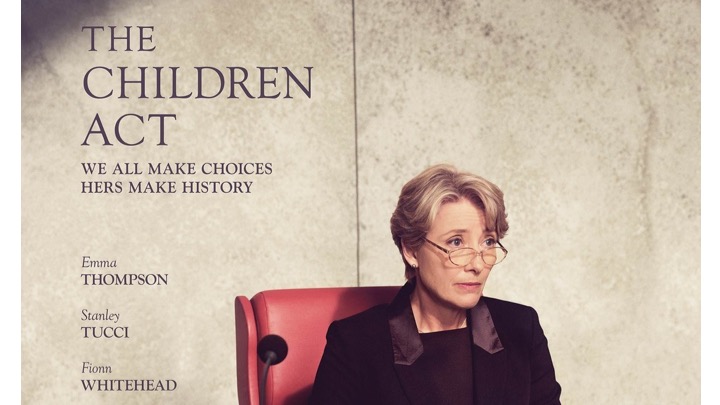“The Children Act” – “There can be no keener revelation of a society’s soul than the way in which it treats its children.” – Nelson Mandela
Judge Fiona Maye (Emma Thompson) faces difficult decisions every day. With stacks of high profile cases and judgments piled up in her well-documented history, the work refuses to slow down in her present. On any given weekday, one can find Judge Maye quietly stewing in her chambers, pouring over documents, making phone calls, and wrestling with conflicting – and sometimes explosive – particulars.
From her office, she briskly walks – several times a day – to and from her courtroom, a place where her chair sits dramatically higher than the lawyers, plaintiffs, defendants, court reporters, and spectators, who reside far below.
Director Richard Eyre’s camera captures angles from the courtroom attendees’ perspective, and from down here, Judge Maye seemingly carries the starched authority of the UK’s Prime Minister, the UN Secretary-General or Hera herself. You see, her interpretations of the law behave as permanent verbal-tapestries that set lasting consequences for the country.
In Eyre’s “The Children Act” – to no one’s surprise – Judge Maye has a troubling case involving children, or in this case, one teenage boy. Adam (Fionn Whitehead), a 17-year-old, suffers from leukemia but refuses a blood transfusion because of his religious beliefs. Fiona must determine if doctors can intervene with the said transfusion.
The film works very well as an intriguing courtroom drama. Well, for about 45 or 50 minutes.
Through writer Ian McEwan’s script, Fiona makes her decision fairly early in the story and then copes with the repercussions in a lengthy denouement. One that feels clunky and middling. The reasoning for the narrative’s structure is so Fiona – an exceedingly brilliant legal mind – can grow on a personal-level by inhabiting her verdict at ground level, rather than settling on the problematic case and walking away. This time, she cannot just step aside from her towering chair and exit stage left into her chambers.
In theory, this story arc has its place, but in practice, it feels noticeably forced. It’s like stopping by your neighborhood coffee shop, jumping over the counter and begin working with your favorite barista. Sounds like a fresh opportunity to bond with a familiar face for eight hours that day, but in a practical sense, what about your current responsibilities, and wouldn’t the manager object that you skipped your official job interview?
Plus, how do you make a vanilla bean latte with a splash of pumpkin spice anyway?
The film falls into this trap, and our disbelief moves from suspension to resumption.
Thompson and Stanley Tucci (who plays Fiona’s husband Jack) are the movie’s two saving graces. The second major narrative thread is their relationship, which has fallen under a terrible strain for years.
Like Judge Fiona Maye, Thompson throws everything into her work, and she thrives in her richest role since 2013’s “Saving Mr. Banks”. Thompson’s Fiona gladly welcomes her career’s forceful weight, but due to the affecting sways within the legal world, she has to keep her feelings in check while in court. This practice spills into her home as well, as she shuts down emotionally 24/7, which leaves Jack in a romantic lurch.
Many of the movie’s best moments are the frequent and frank exchanges between Fiona and Jack, and unless their wounded marriage takes a dramatic course-correction, the consequences will prove severe and swift. Even though Fiona’s job comes with massive responsibilities, Eyre and McEwan furnish equal weight to the couple’s relationship. Jack frequently offers pragmatism to appeal to her sensibilities, but nether logic or sentiment can easily crack Fiona’s shell.
Their marriage seems worth saving, and Thompson’s and Tucci’s combined wealth of thespian know-how, almost saves the “The Children Act”, but not quite. Then again, maybe leave the children at home on a lazy Saturday and treat yourself to Thompson’s best work in five years.
⭐⭐ 1/2 out of ⭐⭐⭐⭐
Image credits and Trailer credits: Entertainment One UK




